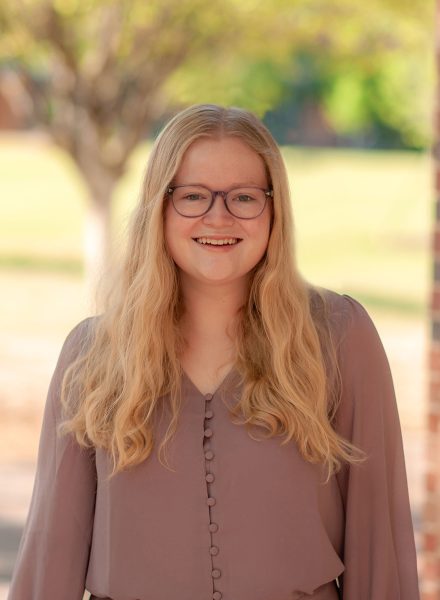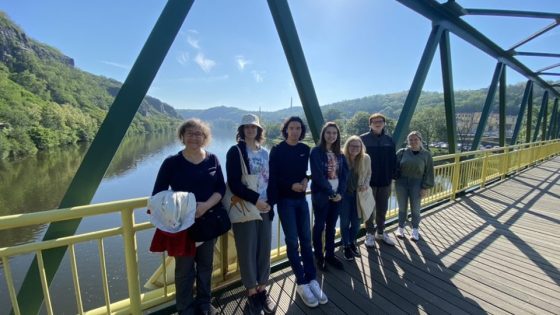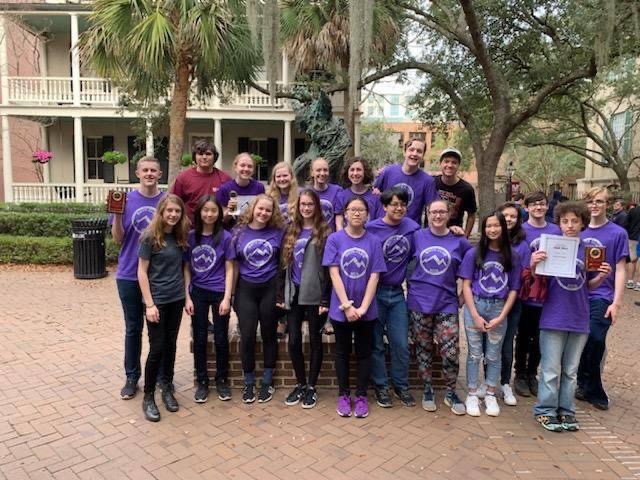
The Department of Materials Science and Engineering is excited to announce Perry Berlin as a Grand Challenges Scholar! Perry is a second-year undergraduate in MSE and joins an elite association of high-achieving engineering students across the nation who are working together to face the Grand Challenges of Engineering in the 21st century.
In conjunction with the NC State University College of Engineering, the National Academy of Engineering Grand Challenges for Engineering, created in 2008, presents an aspirational vision of what engineering needs to deliver to all people. Its vision: “Continuation of life on the planet, making our world more sustainable, secure, healthy, and joyful,” aims to heighten awareness among future engineers about the challenges that we face in today’s world.
We sat down with Perry recently to learn more about her background.
You have an impressive background! Other than being accepted into the elite Grand Challenges Scholars program, what other programs have you participated in?
Perry: I am in the University Honors Program (formerly University Scholars Program). I am also the Vice President of the Engineer’s Council. I am an MSE major and began a minor in Science Communications this summer. To fulfill my Multicultural requirement for the Grand Challenges Program, I was able to study abroad in Prague with my E101 classmates and fellow MSE student/roommate Zoe Watts. The College of Engineering even let us do a takeover of their Instagram account while on our trip, and it is currently highlighted on their stories!

Of the four themes stated in the Grand Challenges vision, which one resonates most with you?
Perry: Great question! For me, it is Sustainability, specifically, developing carbon sequestration methods. There are too many carbon dioxide emissions in the atmosphere, and developing carbon sequestration methods can pull out the CO2 from the air and give it another purpose. I aim to work for a company someday like Carbon Engineering based in Vancouver that will allow me to put this science into practice.
That sounds really advanced! How did you learn about carbon dioxide emissions?
Perry: I learned about carbon dioxide emissions in my fall 2021 E102 course by Dr. Olgha Qaqish. But I have been interested in climate issues since high school. I was fortunate to have gone to an engineering high school where I was encouraged to think about problem-solving, and it was not long before I narrowed down my focus to climate issues.
Your high school sounds like it really prepared you for a rigorous college engineering program. Can you tell me more about the program?

Perry: I attended Nesbitt Discovery Academy located in Asheville, North Carolina. There, I was exposed to so many different engineering tools such as CAD modeling, and VEX robotics software. My classes really did prepare me for my college program. I was able to shop around early and discover what discipline of engineering was the best fit for me. I took Introduction to Engineering Design and enjoyed it. I took Principles of Engineering and learned I was not a fan of truss calculations since it is a civil engineering course. I took Computer Integrated Manufacturing, where I learned how to use a CNC machine, as well as a deep understanding of manufacturing processes, which was my favorite course by far. In my senior year, I worked on a team capstone project similar to FEDD. We were not able to physically prototype due to covid, but I still learned a lot about putting the engineering design process into action. With about a 70:30 female to male class body makeup, I felt empowered and lucky to have found my calling so early.
But you weren’t always an engineer were you? What else helped shape your education?

Perry: I was a theater kid growing up! People may not realize it at first, but being in theater taught me how to improvise on the spot. It taught me how to communicate effectively, and it helps people learn how to work together. I was so excited to learn that one of my perks as a University Scholar was receiving tickets to DPAC!
Your story is so inspiring! What is next in store for you?
Perry: As Grand Challenges Scholars, we are tasked with confronting three to four smaller challenges during school, but we are aiming to solve the Grand Challenges. This is to make engineers ready for real-world challenges. I CODA-ed in the spring 2022 semester, and I am considering becoming an MSE ambassador and joining the NC State Chapter of Materials Advantage Professional Society.
Thank you so much for your time. We know you have amazing things on the horizon. We may circle back to you in three years to check in about solving the grand challenges!
—–
To learn more about how you can become a Grand Challenge Scholar, please visit their website for application and qualification details.
